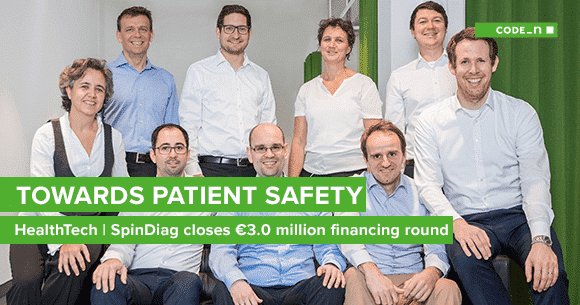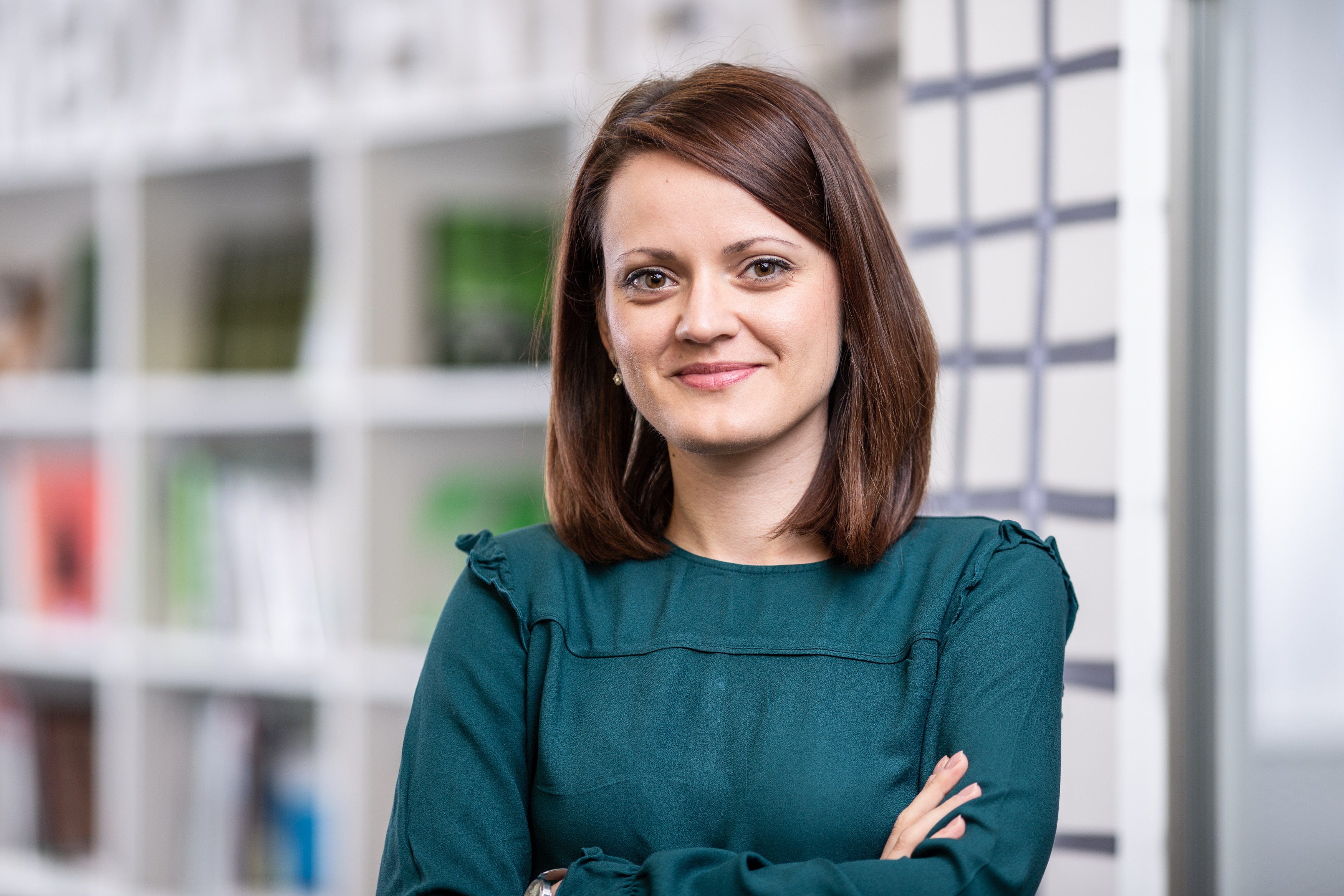One step closer to market entry | Healthcare startup SpinDiag closes second financing round
 A tireless commitment towards making the world a little better – this is what drives the success of the growing team at SpinDiag. The CODE_n Alumnus made headlines once again last month, when they closed their second financing round of €3.0 million to complete product development of its revolutionary point-of-care screening system for antibiotic-resistant bacteria. The HealthCare startup is expected to enter the EU market in 2020 and provide doctors with a solution that allows them to make an informed decision – to isolate or not the patient – on the spot. And the team doesn’t stop here. SpinDiag successfully carried out the planning for FDA approval, paving the way for the development of their U.S. regulatory and market access strategy. We sat down with Dr. Mark Keller, Chief Product Officer at SpinDiag to find out all about it.
A tireless commitment towards making the world a little better – this is what drives the success of the growing team at SpinDiag. The CODE_n Alumnus made headlines once again last month, when they closed their second financing round of €3.0 million to complete product development of its revolutionary point-of-care screening system for antibiotic-resistant bacteria. The HealthCare startup is expected to enter the EU market in 2020 and provide doctors with a solution that allows them to make an informed decision – to isolate or not the patient – on the spot. And the team doesn’t stop here. SpinDiag successfully carried out the planning for FDA approval, paving the way for the development of their U.S. regulatory and market access strategy. We sat down with Dr. Mark Keller, Chief Product Officer at SpinDiag to find out all about it.
Iulia: Hello Mark. It’s a pleasure to speak to you again. First things first. Congratulations on securing a second financing round of 3 million euros! That’s amazing news! Tell us how much has changed for SpinDiag since 2017.
Mark: Thanks for having us on the CODE_n blog again! The second financing round is definitely the greatest and most important milestone for us because it guarantees that we can continue our journey towards revolutionizing the diagnostics market. Our seed financing round in mid-2017 had already provided a tremendous boost to our venture: the SpinDiag family has grown to 14 people, who bring long-term expertise from the MedTech industry and top-notch knowledge from academia with a shared enthusiasm for working at an innovative startup. We also had to move to a bigger office and we had a great time turning it into a productive, creative, and fun working space for everyone. You should come visit us in our lounge room for creative meetings in Freiburg! Most importantly, our system successfully passed pilot trials at the Freiburg hospital and the great results gave us the definitive confirmation that we are on track to bring our product to market. This provided a big boost to the whole team.
Iulia: What is the SpinDiag one system? Why is it important to run point-of-care screening tests in hospitals? How are you looking to change the healthcare environment for patients?
Mark: The SpinDiag one system will enable any healthcare facility to perform infectious-disease diagnostics tests with lab-quality results in no time, right on spot. The system consists of a disposable disk which can take up a patient sample – for example a swab sample from the nose – and a small-sized player that takes up the disk and processes it. Inside the disk, a gene-based analysis of the patient’s sample is performed fully automatically and the test results can be found in the electronic patient file. Our first disk will look for drug-resistance genes and will allow hospitals to check whether a patient brings in antibiotic-resistant bacteria that are hard to treat and should be prevented from spreading to other patients. Hospitals are heavily and increasingly struggling with this problem, which caused more than 30,000 deaths in the EU this year. Why? Guidelines suggest testing an increasing number of admitted patients – currently 40%, to keep them in isolation until the test results are available, which take 2 to 3 days.
That’s impossible to comply with. We will shorten this time period to 30 minutes. Doctors will be able to take immediate and informed decisions – no more waiting for lab results or taking a guess at whether a patient should be isolated or not. It will disruptively change the way we all think of diagnostic medicine and will increase patient safety dramatically. SpinDiag one will be the first system to be seamlessly integrated into the routine workflows at the point-of-care and will be outstandingly easy to use because we tailored it to the sample type, the needs of the nursing staff, the limited space and the hectic pace of emergency departments. This will ensure that users will love to use it, keeping a safe process up and running 24/7.
Iulia: Your aim is to deliver an economical system for increased patient safety. At what stage are you in the product development? When and where will the system make its market entry?
Mark: Our system will be economical, because healthcare facilities will save on costs related to unnecessary isolations until test results are available and treatment of infected patients. Even more important, our system will increase patient safety, because for the first time, healthcare facilities will be able to test all-risk patients for all relevant antibiotic-resistant bacteria, consistently treating positively-tested patients in isolation from others. SpinDiag one is close to being ready for clinical trials starting next year. Upon completion, we plan to enter the EU market in 2020. FDA-approval for the US market will then be the next milestone.
Iulia: How do you plan to implement the SpinDiag system in various healthcare facilities worldwide? What are some of the key steps and challenges you need to take?
Mark: Antibiotic resistance in bacteria is a serious global public health threat and there are hospitals in many countries, which are eager to try out our system. These hospitals – some of which will also perform the clinical trials – will obviously be our first customers and will receive a special level of support from SpinDiag and early access to future products to reward them for their early interest. Luckily, many of these hospitals are key opinion leaders in the field of point-of-care testing and antibiotic-resistances, and their application of our system will likely boost our sales to other hospitals. We are currently in discussion with distributors as well as strategic partners, to work together on international sales.
Iulia: Your goal is to make SpinDiag a sustainable, innovative and valuable investment in the future for everyone involved. What are some of the future products SpinDiag will be working on?
Mark: Hospitals that invest in our system will, on the one hand, strengthen their position in the fight against drug-resistant bacteria. On the other hand, they will step into the future of syndromic testing in general: whenever a patient is admitted with a set of symptoms that leave room for interpretation, but require immediate action, future disks can be run in the same player to get answers as soon as possible. We have disks for the diagnosis of sexually transmitted infections (STI), respiratory tract infections (RTI), and resistant tuberculosis (TB) in our product pipeline. One player, endless disks – that’s what keeps us going (laughs).
Iulia: Thank you, Mark for the insightful interview. Keep us posted on your next milestones and best of luck preparing your product launch on the EU market!






Comments